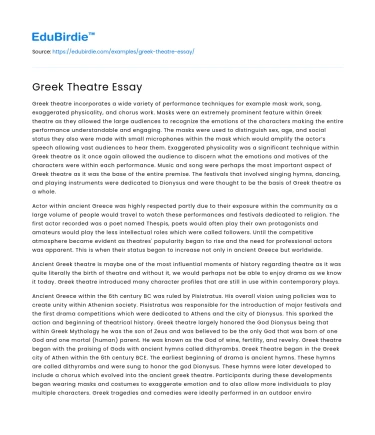Greek theatre incorporates a wide variety of performance techniques for example mask work, song, exaggerated physicality, and chorus work. Masks were an extremely prominent feature within Greek theatre as they allowed the large audiences to recognize the emotions of the characters making the entire performance understandable and engaging. The masks were used to distinguish sex, age, and social status they also were made with small microphones within the mask which would amplify the actor’s speech allowing vast audiences to hear them. Exaggerated physicality was a significant technique within Greek theatre as it once again allowed the audience to discern what the emotions and motives of the characters were within each performance. Music and song were perhaps the most important aspect of Greek theatre as it was the base of the entire premise. The festivals that involved singing hymns, dancing, and playing instruments were dedicated to Dionysus and were thought to be the basis of Greek theatre as a whole.
Actor within ancient Greece was highly respected partly due to their exposure within the community as a large volume of people would travel to watch these performances and festivals dedicated to religion. The first actor recorded was a poet named Thespis, poets would often play their own protagonists and amateurs would play the less intellectual roles which were called followers. Until the competitive atmosphere became evident as theatres' popularity began to rise and the need for professional actors was apparent. This is when their status began to increase not only in ancient Greece but worldwide.
Save your time!
We can take care of your essay
- Proper editing and formatting
- Free revision, title page, and bibliography
- Flexible prices and money-back guarantee
Ancient Greek theatre is maybe one of the most influential moments of history regarding theatre as it was quite literally the birth of theatre and without it, we would perhaps not be able to enjoy drama as we know it today. Greek theatre introduced many character profiles that are still in use within contemporary plays.
Ancient Greece within the 6th century BC was ruled by Pisistratus. His overall vision using policies was to create unity within Athenian society. Pisistratus was responsible for the introduction of major festivals and the first drama competitions which were dedicated to Athens and the city of Dionysus. This sparked the action and beginning of theatrical history. Greek theatre largely honored the God Dionysus being that within Greek Mythology he was the son of Zeus and was believed to be the only God that was born of one God and one mortal (human) parent. He was known as the God of wine, fertility, and revelry. Greek theatre began with the praising of Gods with ancient hymns called dithyrambs. Greek Theatre began in the Greek city of Athen within the 6th century BCE. The earliest beginning of drama is ancient hymns. These hymns are called dithyrambs and were sung to honor the god Dionysus. These hymns were later developed to include a chorus which evolved into the ancient greek theatre. Participants during these developments began wearing masks and costumes to exaggerate emotion and to also allow more individuals to play multiple characters. Greek tragedies and comedies were ideally performed in an outdoor environment, earlier greek theatre performances were particularly performed closer to the city centers or next to hillsides to ensure that audiences standing or sitting could watch and/or listen to the chorus’s praising their God/hero. Greek theatre has created the foundation of the theatre as we know it today and has helped shape/evolve modern theatre. From the structure of the stage to the performance structure, Greek theatre has helped to shape modern-day theatre into what it is known as today.
Greek theatre has placed a large influence on modern-day theatre. From structure, script, and performance, Greek theatre has created the foundation and has largely been an influence on the evolution of modern-day theatre. Theatre within the 6th century BCE had three distinct performance area structures, the scene (known as the stage), the orchestra, and the audience, which again are the main structural areas of today's theatres. The audience’s seating was placed at levels that increased in height to ensure that all audience members could hear the action of the stage with clarity (acoustics). This had continued through to modern-day theatre, most theatres created have seats rising in levels to ensure sound levels are the same no matter the distance the audience member is from where the performance is occurring. Masks and costumes are other attributes that were displayed within these early centuries. Masks were used to emphasize the emotion of the character as well as to ensure facial expressions were visualized with clarity. Masks helped to create distinct differences between the characters personalities helping the audience to grasp a better understanding of the storyline. This has evolved throughout the modern-day theatre. Masks and costumes within the 21st century have been used to create the same effect on the audience, although the material of masks has evolved to create a more realistic effect, it has allowed many play writers to create and produce their envisioned characters. Greek theatre was responsible for the creation of slapstick comedy. These comedic performances began in 486-487 BC and mocked men who upheld great power at the time, exaggerating their emotions. Slapstick comedy has influenced history, from Charlie Chaplin, and the three stooges to the Simpsons slapstick comedy is stilled involved in today's comedic shows.






 Stuck on your essay?
Stuck on your essay?

